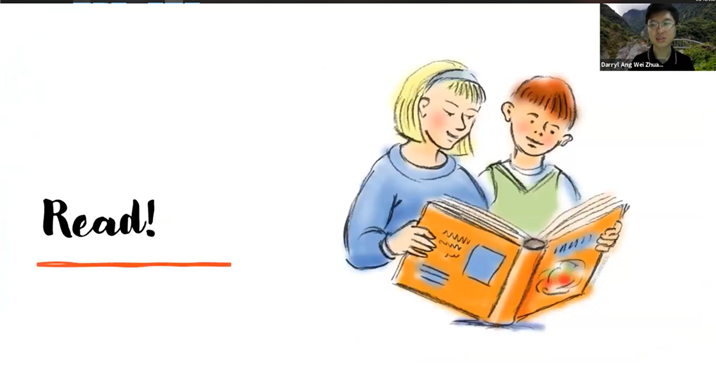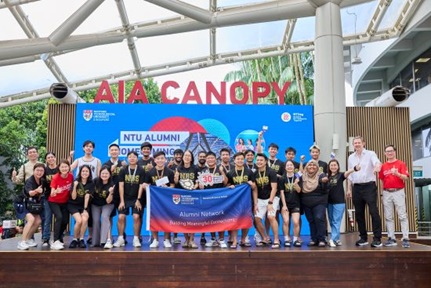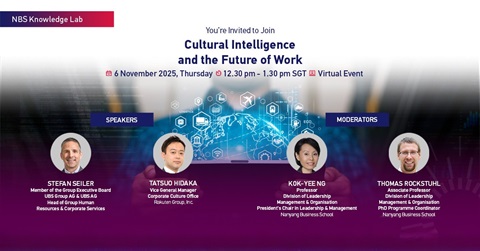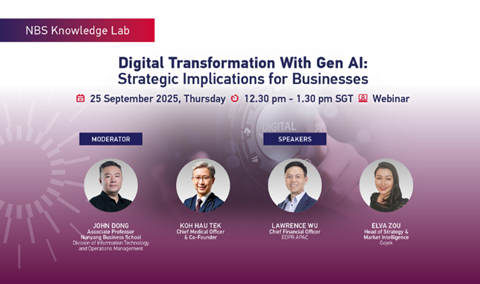Will you please read with me?
Four Nanyang Business School student volunteers discover that in this pandemic era where life has gradually moved online, volunteering work is now possible via Zoom platforms too
In July 2020, Darryl Ang signed up for the Read with Me @ MINDS Woodlands Gardens School (WGS) programme to read with students from the Movement for the Intellectually Disabled of Singapore (MINDS). Darryl is an accountancy Year 3 undergraduate from Nanyang Technological University’s (NTU Singapore) Nanyang Business School (NBS).
“The objective of the programme is to teach communication, using the storytelling platform to engage the students and improve their overall communication skills,” said Mrs Chan Ai Lin, Senior Lecturer at NBS and Coordinator of the project.
Students at WGS are between the ages of seven and 18 with mild intellectual disability. “They find it challenging to pick up skills most of us take for granted. Most will not be able to take up open employment. Some are non-verbal and others are autistic,” she explained.
“After the first online reading session, I realised that the students taught me more than I taught them,” said Darryl, who has since volunteered with the programme for three rounds. Each round of volunteering spanned 10 weeks, largely overlapping with the NTU semesters.

As part of his introductory video, Darryl mentioned that would be reading the series of Peter & Jane books with his mentees
“I first started reading with a non-verbal student, and although he didn’t speak, he understood me. I would use the Annotate function in Zoom or draw a happy face on paper to ask him how he was feeling,” recalled Darryl.
Perfect timing
The physical reading program at WGS was suspended in March 2020 when COVID-19 happened. In May 2020, Mrs Chan, who was one of the volunteers for the physical reading program, asked MINDS to consider adapting the programme as an online venture instead. “I discussed with the MINDS teachers how best to structure this online reading session. This was the first time MINDS was trying out online lessons and we had no idea how the students would react to interacting online,” she recalled.
At the same time, because of the circuit breaker measures, many of the undergraduates’ planned internships were disrupted as organisations pulled back on internship offers. “This happened to many NBS and other university students, too. I thought this would be a good opportunity to engage our undergraduates for a meaningful service-learning programme,” she added.
Together with MINDS, Mrs Chan developed the Read with Me @ WGS, a WGS-NTU/NUS Online Reading project, working to recruit, identify resources needed, and gathering reviews from both the student volunteers and MINDS teachers after each session. The team also developed detailed strategies to ensure the volunteers were well prepared and trained in communicating with non- verbal and autistic WGS students. This contributed to the success of the programme by promoting students’ learning through volunteers’ accommodating and adapting to the students’ needs.
The Read with Me @ WGS has grown. In the most recent August-November 2021 semester, a total of 28 volunteers delivered the weekly online reading sessions to some 32 WGS students. Out of these 28 volunteers, 8 were freshmen.
It’s OK to be different
Founding and third time volunteer Kiwi Kwee, an accountancy Year 3 undergraduate, was initially worried that she would not be able to work with the students effectively.
“Unlike my part-time gig teaching music, I wondered about the metrics of measuring teaching success at MINDS. But after working with the students, I decided my two goals will be: to make sure that they have fun and to teach them how to interact with people outside of MINDS,” she explained.

Kiwi introducing herself to MINDS’s students with the help of a visual aid
“At the start I thought I would have to talk a lot to try to engage with the students. But during the first session, I found that the student was actually trying to engage with me!” recalled Darryl with a laugh.
Double degree (Accountancy and Business) Year 2 undergraduate and first-time volunteer Ng Zhi Hong, was concerned that he would bore the students, admitting that he was a poor reader. But through the sessions, he learnt that the students were all very different.
“I had an extroverted student who just wanted to chat, and a reserved student that I had to try to engage. There is no one teaching method – we have to adapt and think up ways such as using images, videos, and e-stickers as rewards,” he recalled.
Preparing for the programme
Two volunteers conduct the reading session via Zoom to each WGS student for 30-45 minutes once a week. Before the start of the reading programme, the students were shown a one-minute video made by the volunteer assigned to them. The volunteers were challenged to make a simple yet creative video using their handphones, to introduce themselves to the students before the first reading session.
“I asked around for ideas and in the end, I just went to my fridge and started pulling out items to show them “this is what I like” and “this is what I don’t like”,” said double degree (Accountancy and Business) Year 2 undergraduate and first-time volunteer Elna Yeo.

Elna introducing herself with: "I like Nutella!"
The volunteers were also given a training session where profiles of the students and strategies for handling challenging scenarios were shared.
“We learnt basic and practical things like keeping our sentences short,” said Zhi Hong. “Students may sometimes react only to the last word of the sentence, so when we ask them a yes or no question, sometimes we have to tweak the question to see if they are replying just by repeating the last word of the sentence. This was something that I had not thought about before volunteering here,” he added.
Slowly becoming friends
Over subsequent sessions, the volunteers began to develop a connection with the students. “What I didn’t expect was for our interactions to become so meaningful. Even if all I did was make my student smile when I told a joke or helped him learn one new word – it was a great achievement and made me feel so warm inside,” said Kiwi.
For Elna, the one thing that she did not expect was how tiring a 30-minute online session could be. “After the first experience, what I felt was “wow, it’s so tiring!” – tiring but very fruitful,” she mused.
“I think we should have more open conversations about volunteer work. We shouldn’t think about volunteering as taking up time and energy and that it is not worth it, because even in these small ways, we can make a difference to the lives of others,” she added.
Lessons in goals and perspectives
Volunteering has come a long way, and especially in the face of a pandemic. “Who would have thought that we can now do volunteering work through a Zoom session? Volunteering work is evolving,” says Zhi Hong.

Zhi Hong showing off his favourite drink as part of his self-introduction
“When I started, I thought I’d be the one giving and that I would not be taking anything out from this – I was there to teach them how to interact,” recalled Darryl. It turned out the students taught him to appreciate the little things in life, instead of mulling over petty matters that threaten to dampen our days.
“I ask my students if they are happy or sad, and they may say that they are sad and they tell you about it. But the next moment, they will tell you that they are happy! I ask myself: why can’t we be like that?” he mused.
Positive feedback from MINDS
WGS teachers shared positive feedback from the online reading programme. “The teachers shared that the students who attended the online programme were more responsive in classes after attending the online reading sessions, with some students even initiating conversations which they did not do in classes before,” said Mrs Chan.
Some of the more reserved students started to smile more. In response to a simple survey on whether they liked the online reading session, the WGS students said “yes”. Based on the positive feedback, MINDS decided to continue with the online reading programme and it is ongoing today.
“At MINDS@WGS, there are about 240 students and we have reached only 13% of them. There is demand for this programme, we have to see how to expand it,” she concluded.

.tmb-listing.png?Culture=en&sfvrsn=d48abb4_1)




